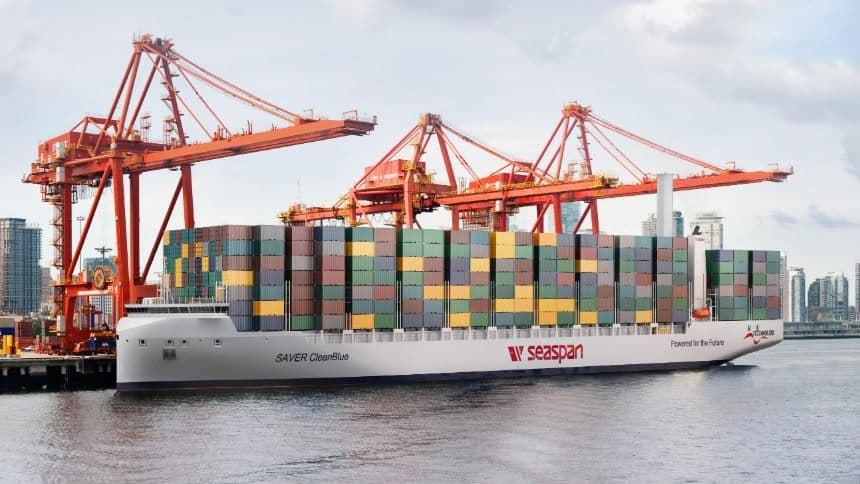ABS and Lloyd’s Register award new ammonia vessel design approval in principle

Athens, Greece — A new ammonia-fueled 3,500 TEU container vessel design has received Approval in Principle (AiP) from the American Bureau of Shipping (ABS) and Lloyd’s Register (LR). This milestone results from the collaboration of a cross-industry taskforce including A. P. Møller-Mærsk, MAN Energy Solutions, Deltamarin, Eltronic FuelTech, ABS, and LR, led by the Maersk Mc-Kinney Møller Center for Zero Carbon Shipping. This achievement marks significant progress in utilizing ammonia as an alternative marine fuel.
“To unlock the potential of sustainable ammonia as an alternative, low-emissions marine fuel, we must carefully address the safety issues on board and ensure a safe and healthy working environment for our seafarers and people in ports. The AiP of the new ship design is a major milestone on this journey, as it demonstrates that safety criteria for the application of ammonia as the main fuel is within tolerable levels of industry safety management practices,” says Claus W. Graugaard, Chief Technology Officer, Onboard Vessel Solutions at the Mærsk Mc-Kinney Møller Center for Zero Carbon Shipping.
Graugaard continues, “The fact that we have both ABS and LR granting this AiP in parallel is a testimony to the robustness of the design and to the iterative risk assessment and systematic risk management intelligence that have gone into it. This development work has only been possible because all project partners have contributed innovative thinking and a willingness to share knowledge. Collaboration is the fastest way to co-create the prescriptive rules and innovative solutions we need.”
When awarding an AiP, classification societies evaluate novel technology, examining all fundamental aspects of the ship design and ensuring general compliance with associated rules and regulations.
The project will now address the remarks raised on the design, with the Mærsk Mc-Kinney Møller Center for Zero Carbon Shipping continuing to lead the work. The project will extend into a second phase involving a charterer and ship owner.
“This project is an important step on the road to the wider adoption of ammonia as a marine fuel by the industry. ABS is committed to utilizing our highly specialized technical knowledge and research capabilities to explore viable, safe solutions for our clients’ decarbonization challenges. ABS is proud to contribute to this project team and to the work of the Mærsk Mc-Kinney Møller Center for Zero Carbon Shipping,” said John McDonald, ABS President and COO.
Andy McKeran, Chief Commercial Officer of Lloyd’s Register, commented, “Safety remains a critical aspect for the widespread adoption of ammonia as a marine fuel. This AiP demonstrates a clear cross-sector intention to ensure that ambition becomes reality. Through our previous collaborations, including the joint study with the Mærsk Mc-Kinney Møller Center for Zero Carbon Shipping and the LR Maritime Decarbonisation Hub into Quantitative Risk Assessment for ammonia ship design, LR has continued to build on its expertise as a trusted adviser to the maritime value chain, enabling us to put the mitigation of risks for ammonia vessels at the heart of our AiP process.”
About the Design
The design outlines a commercially viable and safe ammonia-fueled 3,500 TEU container feeder, focusing on crew safety while minimizing loss of cargo capacity. The ammonia tank capacity (4,000 m³) supports a full round trip of relevant trades. A. P. Møller-Mærsk provided extensive ship design experience; MAN Energy Solutions contributed engine manufacturer expertise; and ABS and LR ensured compliance with safety and statutory standards. The detailed concept design was created by Deltamarin, with the fuel system designed by Eltronic FuelTech. Risk assessments involved participation from DMA and MPA.
About AiP
Following extensive HAZID and HAZOP risk analysis, the detailed design package, including drawings, calculations, and reports on ship and fuel system design, was submitted to ABS and LR for review in the context of the AiP. Post-AiP, the project team will integrate updates and feedback from the two classification societies, with a summary and project documentation to be issued in a report later this year. This report will be publicly available free of charge on the website of the Mærsk Mc-Kinney Møller Center for Zero Carbon Shipping.
